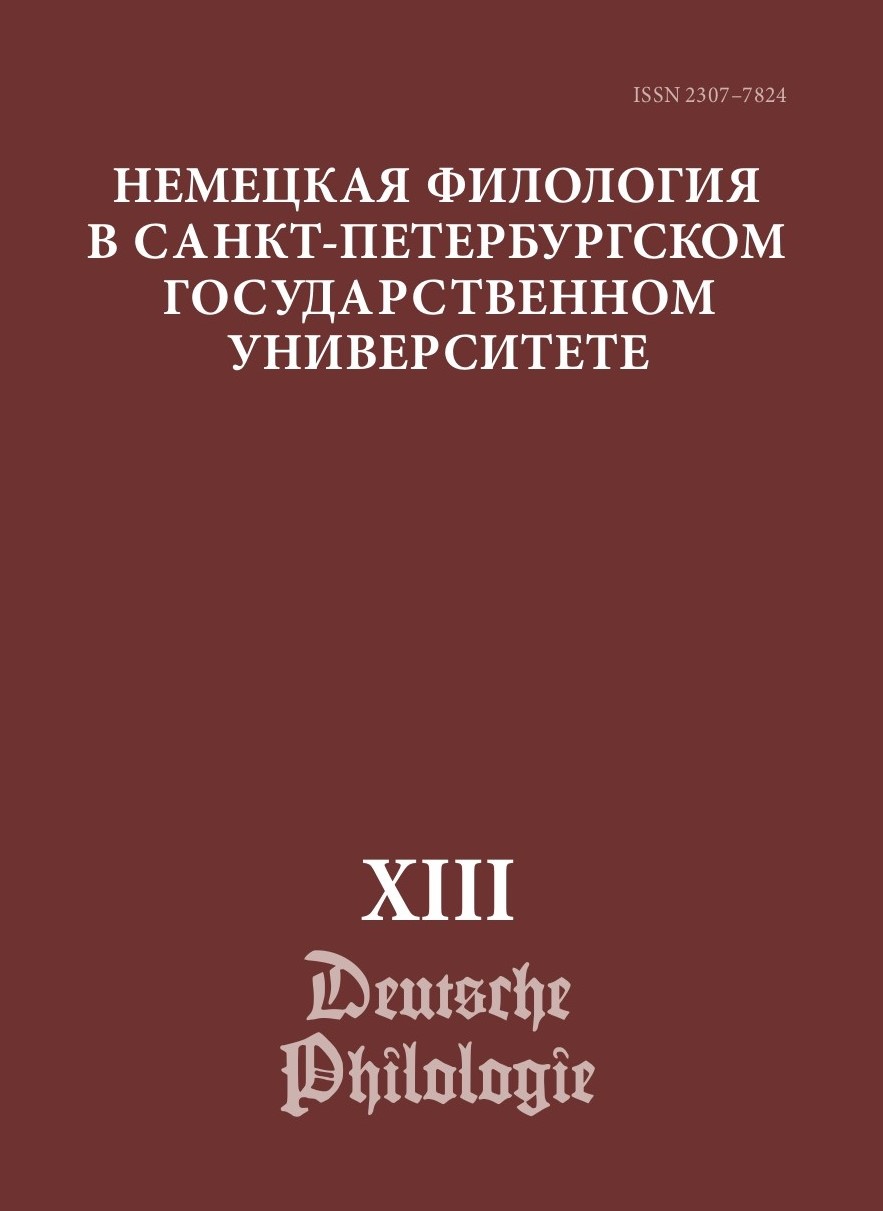LEXICAL AND GRAMMATICAL FEATURES OF CORPORATE CHRISTMAS AND NEW YEAR’S GREETINGS IN GERMAN AND RUSSIAN CULTURES
DOI:
https://doi.org/10.21638/spbu33.2023.108Abstract
The article focuses on the text type greeting in German and Russian languages. It aims at identifying lexical and grammatical means of corporate greeting in German language culture. The study is novel in that it discusses contemporary corporate greetings in German and in Russian as a part of the language politeness. The methods used in the study include continuous sampling method, lexical and semantical analysis, and comparison. The greetings under discussion consist of three obligatory (address, wishes and signature) and two extra parts (introduction and gratitude). The introduction aims at establishing of festive mood and can have a quote in German greetings. In Russian congratulations, the introduction is rare, in certain cases it is replaced with congratulation on a holiday. The reason why in German texts there is no congratulation is the fact that the congratulation is written on a card which has pre-printed greeting. There are semantical differences between Russian and German wishes. The Russians tend to express wishes for the whole upcoming year. They are about job and private life of an addressee. The Germans focus their wishes on Christmas, and an addressee is supposed to spend it in a quiet company of relatives and friends. The wishes on New Year’s Day are similar to Russian ones. The difference in wishes partly would raise from the difference in calendars: While the Germans celebrate Christmas right after working days, the Russians have it at the end of a series of days-off at the beginning of January.
Keywords:
language politeness, greeting as text type, greeting’s structure, semantics of wishes, German culture studies
Downloads
References
Литература
Арутюнова Н. Д. Фактор адресата // Известия АН СССР. Сер. литературы и языка. 1981. Т. 40, № 4. С. 356–367.
Гловинская М. Я. Семантика глаголов речи с точки зрения теории речевых актов // Русский язык в его функционировании: Коммуникативно-прагматический аспект. М.: Наука, 1993. С. 158–218.
Егоров В. П. Этика деловых отношений. М.: Юридический институт МИИТа, 2016. 142 с.
Езан И. Е., Неборская Л. Н. Эллиптические конструкции в немецкой разговорной речи // Международный научно-исследовательский журнал. 2016. № 11. Екатеринбург: ИП Соколова М. В. С. 27–30.
Капкан М. В., Лихачева Л. С. Деловой этикет: учеб. пособие. Екатеринбург: Издательство УрГУ, 2017. 168 с.
Колтунова М. В. Язык и деловое общение: Нормы, риторики, этикет: учеб. пособие для вузов. М.: Экономическая литература, 2002. 271 с.
Ларина Т. В. Категория вежливости и стиль коммуникации: Сопоставление английских и русских лингвокультурных традиций. М.: Языки славянских культур, 2009. 512 с.
Лассан Э. Культурные сценарии мышления и этикетные интернет-жанры (об интернет-поздравлениях в четырех культурах) // Коммуникативные исследования. 2015. № 4 (6). С. 22–40.
Медведева Е. В. Рекламная коммуникация. М.: Едиториал УРСС, 2003. 280 с.
Немчинова Н. В. Корпоративная поздравительная открытка: коммуникативный и деловой аспект // Известия РГПУ им. А. И. Герцена. 2008. № 86. С. 217–221.
Низеева Д. Р. Фреймовый анализ речевого акта «Поздравление» (на материале немецкого языка) // Вестник ЧГУ. 2009. № 1. С. 257–260.
Формановская Н. И. Русский речевой этикет: лингвистический и методологический аспекты. М.: Ленанд, 2020. 160 с.
Baumgarten A., Jänecke B. Rußlandknigge. Berlin; Boston: Oldenbourg Wissenschaftsverlag, 2005. 276 S.
Rathmayr R. Höflichkeit als kulturspezifisches Konzept: Russisch im Vergleich // Wechselbeziehungen zwischen slawischen Sprachen, Literaturen und Kulturen in Vergangenheit und Gegenwart / Hrsg. J. Ohnheiser. Innsbruck: Verl. des Inst. für Sprachwissenschaft, 1996. S. 174–185.
Wagner K. R. Pragmatik der deutschen Sprache. Frankfurt am Main, Peter Lang, 2001. 495 S.
References
Arutiunova N. D. Factor of addressee. Izvestiia AN SSSR. Ser. literatury i iazyka, 1981, Vol. 40, no. 4, pp. 356–367. (In Russian)
Baumgarten A., Jänecke B. Rußlandknigge. Berlin, Boston, Oldenbourg Wissenschaftsverlag, 2005, 276 S.
Egorov V. P. Business ethics. Moscow, Iuridicheskii institut MIITa Publ., 2016,142 p. (In Russian)
Formanovskaia N. I. Russian communication etiquette: Linguistic and methodological aspects. Moscow, Lenand Publ., 2020, 160 p. (In Russian)
Glovinskaia M. Ia. Semantics of locutionary verbs in frames of speech acts theory. Russkii iazyk v ego funktsionirovanii: Kommunikativno-pragmaticheskii aspekt. Moscow, Nauka Publ., 1993, pp. 158–218. (In Russian)
Jesan I. J., Neborskaia L. N. Elliptic structures in German conversational speech. Mezhdunarodnyi nauchno-issledovatel’skii zhurnal. 2016, no. 11. Ekaterinburg: IP
Sokolova M. V. Publ., pp. 27–30. (In Russian)
Kapkan M. V., Lihacheva L. S. Business ethics. Study book. Ekaterinburg, Ural University Publ., 2017. 168 p. (In Russian)
Koltunova M. V. Language and business communication: Norms, rhetoric, etiquette: Workbook for universities. Moscow, Ekonomicheskaia literature Publ., 2002, 271 p. (In Russian)
Larina T. V. Category of politeness and communication style: Comparison study of English and Russian traditions. Moscow, Iaz. slavianskikh kul’tur Publ., 2009, 512 p. (In Russian)
Lassan E. Cultural scenarios of thinking and etiquette Internet-genres (on Internet gratulation in four cultures). Kommunikativnye issledovaniia. 2015. no. 4(6). Omsk: OmGU Publ., pp. 22–40. (In Russian)
Medvedeva E. V. Advertisement communications. Moscow, Editorial URSS Publ., 2003, 280 p. (In Russian)
Nemchinova N. V. Business greeting card: communicative and corporative aspects. Izvestiia RGPU im. A. I. Gertsena, 2008, no. 86, pp. 217–221. (In Russian)
Nizeeva D. R. Frame analysis of speech act “Gratulation” (in German language). Vestnik ChGU, 2009, no. 1, pp. 257–260. (In Russian)
Rathmayr R. Höflichkeit als kulturspezifisches Konzept: Russisch im Vergleich. Wechselbeziehungen zwischen slawischen Sprachen, Literaturen und Kulturen in
Vergangenheit und Gegenwart. J. Ohnheiser (Hrsg.) Innsbruck, Verl. des Inst. für Sprachwissenschaft, 1996. S. 174–185.
Wagner K. R. Pragmatik der deutschen Sprache. Frankfurt am Main, Peter Lang, 2001. 495 S.
Downloads
Published
How to Cite
Issue
Section
License
Условия передачи авторских прав на статьи и рецензии, опубликованные в ежегодном периодическом издании «Немецкая филология» регулируются условиями Лицензионного Договора автора с Санкт-Петербургским государственным университетом. В соответствии с Лицензионным Договором опубликованные материалы находятся в открытом доступе, а авторам бесплатно предоставляется неограниченные возможности их распространения и самостоятельного архивирования.




